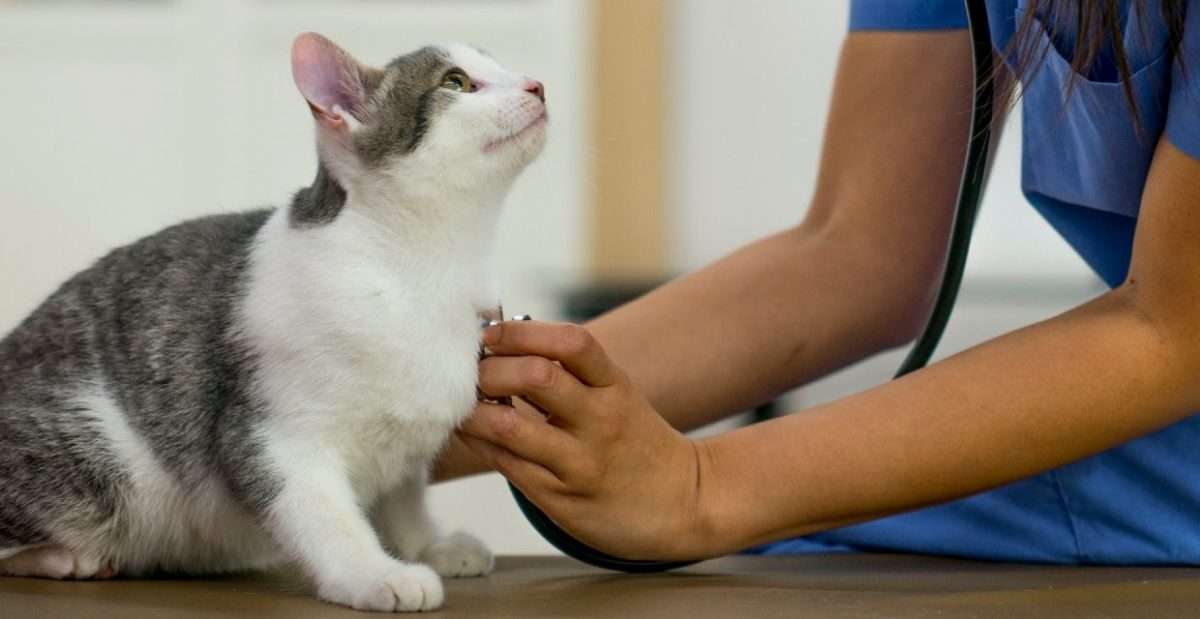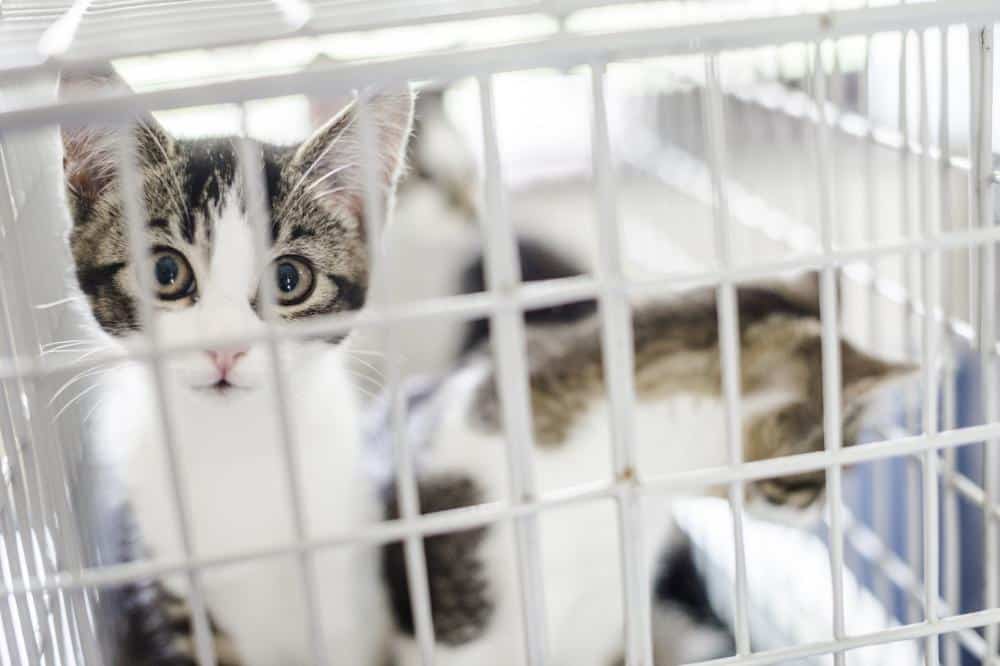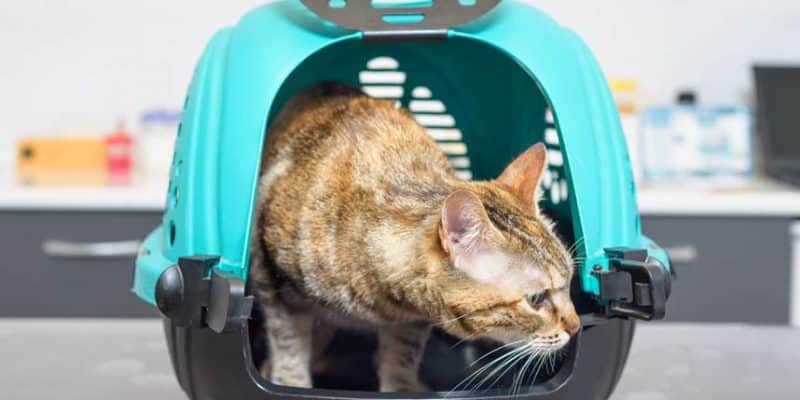Scheduling A Vets Appointment For Your Kitten
Once you know which veterinary clinic you would like to use, its worth calling them to register as soon as possible, even if you dont need an appointment yet. This will ensure that your kitty has veterinary care if there is an unexpected emergency or injury.
When registering, make sure you ask about the clinic’s opening times and what to do in case of emergency if the practice is closed. When calling to book your kitten’s first vet visit appointment, make sure you give plenty of notice to secure an appointment that suits you and fits in with your kittens vaccine and parasite treatment schedule.
Age And When To Take Your Cat To The Vet
Even when your cat seems perfectly normal, its a good idea to head to the vet once per year. An annual checkup can catch minor problems before they become more serious, including everything from obesity to injuries to medical conditions. And if you have an outdoor cat, you might need additional core and non-core vaccinations to protect your feline from the elements. Take a look at when to take your car to the vet based on age:
- Kittens: From 6 weeks until 16 weeks, your kitten needs vet visits approximately every month to receive essential vaccinations. This is also a good time to talk to your vet about spaying, neutering, and microchip services.
- Adults: An annual checkup is generally all that you need for healthy adult cats between the ages of 1 to 7 years old. This will typically cover a head-to-tail physical, blood work, and other testing as needed.
- Seniors: Cats older than 7 years old can benefit from vet visits twice per year. Though cats have a long lifespan, its important to catch age-related conditions as early as possible to ensure proper treatment.
When To Take Your Cat To The Emergency Vet
Is your cat in the middle of a crisis, leaving you unsure of what to do next? Or are you just trying to do some research to help you better understand how to care for your feline friend if anything unexpected should happen? As a cat owner, you dont want to think about having to rush your pet to the emergency vet. However, this is sometimes an unfortunate necessity, and its good to know which conditions and situations might require a trip to the emergency vet in the middle of the night.
Check out the information below to educate yourself on cat emergencies. Understand that this list is not a comprehensive one, but it does cover most of the basics and should give you an idea of how to respond if something is going wrong with your cat. This information can help you prepare for the worst, even though you will hopefully never have to face this type of situation.
You May Like: How To Get A Kitten To Like You
How To Prepare An Indoor Cat For A Vet Visit
When preparing for a vet visit, its best to acclimatize your indoor cat to the cat carrier at least a few days in advance of your vet visit. Line it with blankets or a bed to make it comfortable and place treats or toys inside to make it more appealing to your cat. Give them treats, pets and praise when they explore the carrier, to help them associate it with positive experiences. Pheromone sprays may also help to keep your cat calm.
It is important to keep your cat in the carrier at all times during transportation and while sitting in the waiting room. This will help prevent your cat from escaping or getting injured during the vet visit.
You should also get your cat used to handling by touching, stroking and gently manipulating areas of their body such as their paws, ears, and mouth on a regular basis, so that they are not alarmed when the veterinarian examines them.
Testing For Feline Leukemia And Fiv

It is extremely important and highly recommended that your kitten be tested for feline leukemia and feline HIV prior to introducing them to any other cats in your household. Leukemia and FIV are highly contagious and life-threatening conditions that you wouldnt want to spread to your healthy cats.
The time frame with which kittens should be tested for leukemia and FIV can be frustrating as many owners and shelters want them tested right away so they can bring them into a multicat household without having to create separation for months. This is understandable, but the chances for false positives or negatives are very high in kittens younger than 6 months of age.
The best thing to suggest is having them tested as a young kittens before introducing them to other cats and then retesting them again when they are between 6 and 8 months of age to confirm the results.
Don’t Miss: How Long Can A Cat Live With Lymphoma
Frequent Sneezing In Cats
This is another symptom that is most likely related to allergies. Once again, however, it could be a bacterial or viral infection, and your vet may need to check your cat to be sure.
Wait to see if it gets better in a day or two. If not eating accompanies these symptoms, however, get to the vet immediately.
How Often Should I Take My Senior Cat To The Vet
It’s likely that by its senior years, your cat will need more medical attention to keep them healthy and well as they age. You’ll need to pay more attention to your cat’s health and observe any changes that may be cause for concern.
While this is good practice at any stage of your cat’s life, it’s much more crucial as your feline ages. Contact your vet as soon as possible if there’s anything out of the ordinary that worries you.
How often should I take my cat to the vet?
Ask a professional for FREE
Recommended Reading: My Cat Vomited Yellow Liquid
Changes In Mobility Or Decreased Activity
As we mentioned earlier, senior cats often have undiagnosed osteoarthritis. Even your adult cat may be dealing with this issue. Keep an eye out for changes in mobility, altered gait, being slower to jump, acting stiff, and decreased activity in general. If you notice these signs in your cat, contact your veterinarian.
New Kitten Health Check
Youve anticipated the new arrival by kitten proofing your home and had lots of fun choosing the carrier, bed, blanket, toys and other supplies they will need.
This adorable little bundle of fluff is sure to bring you much joy. In return, you can make a major contribution to your pets happiness and quality of life by providing them with good nutrition, loving attention in a safe, clean environment and regular health checks.
You May Like: Should I Put My Cat Down
Tips For A Productive Feline Vet Visit
Having the right kind of pet carrier for your kitten will make her feel right at home for the trip to the vet. Carriers come in different sizes and are made out of different materials, such as hard plastic or fabric. Determine which of these makes your kitten more comfortable and use it to take her on vet visits. Regular cleaning, along with a favorite toy or blanket will help settle her in her surroundings. If she seems agitated, get her acquainted with the carrier by putting it in your home beforehand and making it a fun, safe, cozy place for your kitten. Leave the door open and fill it with treats and toys. Take her on car rides to get her used to spending time in the carrier.
A calming spray in her carrier can also work wonders. These sprays release pheromones to reduce cat stress and are available at your veterinarians office, online and at pet stores.
Your vet will be your primary source for advice on your kittens health, food, and behavior as she grows into an adult. Make sure that she sees the vet every six months to a year for regular check-ups. Finally, it helps to keep track of common behaviors that your cat exhibits at home in case you or your vet have any questions related to her health. Finally, never be afraid to ask your vet questions about your kitten it can go a long way in helping keep her happy and healthy for many years to come.
When Should I First Take My Kitten To The Vet
It’s best to take your kitten to the veterinarian a few days after bringing them home. This gives them a chance to settle in and time for any stress-induced problems like diarrhea or a picky appetite to subside.
Your kitten may have already had a veterinary health check organised by the breeder, but that doesnt mean they shouldn’t have one with you. Your kitten will have vaccinations due from eight weeks old, so its important to schedule an appointment as soon as possible. If the vaccination course has been started, check with the breeder when the next vaccination is due.
Don’t Miss: Nature’s Recipe Cat Food Reviews
What Is Considered A Pet Emergency
Because cats have such stoic natures, they often dont show clinical signs of illness until its severe. And because cats hide their signs, even subtle signs warrant an emergency visit to the ER veterinarian.
Dr. Justine Lee provides these general guidelines on when you need to seek immediate veterinary attentioneven if its in the middle of the night.
- Hiding in unusual places
- Difficulty breathing, like panting, open-mouth breathing, or a respiratory rate over 50 breaths/minute
- Not moving and lying in one spot
- Crying out in pain
- Excessive drooling or foaming at the mouth
- Any seizure activity
- Making multiple trips to the litter box with no urine coming out
- Straining to urinate or defecate in front of you or in unusual places
- Profuse vomiting
- Not eating for several days
- Lying near the water bowl and drinking excessively but still appearing dehydrated
- Any string hanging out of any orifice
Why Does My Kitten Need More Than One Vaccination

Immediately after birth, a kitten receives a temporary form of immunity through the colostrum, which is the milk produced by mother cats shortly after birth, laden with protective antibodies. This first milk is produced only for a few days after birth and contains proteins called maternal antibodies. For about 24-48 hours after birth, the kittens intestine allows absorption of these antibodies directly into the blood stream. This protects the kitten during its first few weeks of life when its immune system is immature, but in order to remain protected against these diseases, the kitten must produce its own, longer-lasting active immunity.
In order to remain protected against diseases, the kitten must produce its own, longer-lasting active immunity.
Vaccinations stimulate active immunity, but they have to be given at just the right time. As long as the mothers antibodies are present in the kittens bloodstream, they prevent the immune system from responding effectively to the vaccines. When a kitten is ready to respond to vaccinations depends on the level of immunity in the mother cat, the amount of antibody absorbed by the nursing kitten, and the general health and nutrition of the kitten.
To keep up the cats immunity through adulthood, vaccines are repeated once every 1-3 years depending on individual circumstances and vaccine type.
Don’t Miss: Miele Upright Cat And Dog Vacuum
How Often Does My Kitten Need To Attend Routine Veterinary Care Exams
Exactly how often your kitty will need to attend routine veterinary care exams will depend on her age and how healthy she is. Initially, your vet will probably recommend that your furbaby has a check-up every 12 months and annual wellness appointments tend to be standard for young and adult cats. If your kitten hasnt received her full set of vaccinations, you may also need to attend appointments for these to be carried out. You will also need to schedule a visit to arrange to get your kitty spayed/neutered.
If your furbaby becomes unwell and develops a health condition, your vet will almost certainly increase the recommended frequency of her routine veterinary exams. This will enable your professional to monitor her health more closely so that they can react more quickly should the need for sudden treatment arise. This is also the case for senior cats. Our pets shortened lifespan means that their bodies age much faster than our own and age-related changes can cause health problems to develop quite quickly once your kitty reaches her senior years.
Routine veterinary care exams form an essential part of your kittens preventative healthcare program. To schedule an appointment for your feline, or to ask any further questions that you may have, please contact our vets in Miramar Beach, FL at 837-7072.
January 14, 2019
Why Do I Need To Take My Indoor Cat To The Vet
Written bySmall Door’s medical experts
Its a common misconception that indoor cats dont need to go to the vet. While its true that contagious feline illnesses are often contracted via contact with animals in the outside world, there are nonetheless many reasons that regular vet visits are important for indoor cats, from the administration of legally required vaccines to catching issues before they become serious.
In This Article
Don’t Miss: Members Mark Wet Cat Food
What Do I Need To Know About Kitten Behavior
There’s a wide range of kitten behavior because all cats are different. I’ve had many cats over my lifetime, and they all have unique personalities. It’s hard to give a short answer to this question. I will tell you that it is important that you do understand kitten behavior. There’s so much information online, and we would direct you to the best place to go to get some good answers.
If you still have other questions and you’d like to reach out to us, you can call us directly at , you can email us, or you can reach out on Facebook. But please do reach out, and we’ll get back to you as fast as we can.
What Is Safe To Give Cats For Diarrhea
Probiotics are excellent for cats with diarrhea. They are often combined with prebiotics to support gastrointestinal health. When the cats diet is deficient in probiotics and prebiotics, owners can use supplements.
Honest Paws Pre+ Probiotics is a great choice because it contains both prebiotics and probiotics. It makes the poop harder and cleaning the litter box easier. It supports the digestive system, boosts the immune system, and helps with certain skin issues. All in all, it is excellent for overall cat health.
Plus, the supplement comes in a chicken-flavored and easy-to-use powder form. It is safe for adult cats, kittens, and seniors.
Read Also: When Should You Get Your Cat Neutered
Preparing For Your Kittens First Vet Visit
The day is upon youyoull be taking your new pal to the vet tomorrow. What should you do?
One thing about cats is that they know when you will be placing them in their carrier! Im not sure how they know, but they do. Whether its your body language or how you approach them when you call here kitty, kitty, they know and they will hide.
The most popular hiding spot will be under the bed, directly in the middle so you cant get to them, or theyll go through some tiny opening to get behind a cabinet. Try to not tip them off! Ideally, get them used to the carrier before the big day. Leave it out so they can investigate and feed them treats, or even their meals, inside.
How Often Do You Take A Cat To The Vet
Going to the vet can be stressful and exhausting not just for cat owners, but most especially for cats. There is the travel time, your pets exposure to dogs and other animals, to the new place, the unfamiliar noises, endless waiting time, and the list can go on and on.
However, if you take all of these negativities out of the picture, youll see nothing but the importance of these visits to ensure your pets health, so you can give him a long and happy life as much as possible.
Below are the general guidelines to follow on when to see the vet:
Also Check: Generic Seresto Flea Collar For Cats
Spaying And Neutering Kittens
Your kitten can be spayed or neutered anytime between 4 and 6 months of age.
Thankfully, there is far less debate with cat owners about spaying and neutering than there is with dog owners. Usually, because Tomcats are notorious for urinating on things and female cats in heat never seem to stop screaming at you for attention.
The time that your cat is under for their spay or neuter is also a great opportunity to microchip them! These awesome little chips save lives and bring lost animals home!
Set Up A Feeding Schedule

To keep up with your kittens appetite, youll want to establish a daily feeding routine. The best way to ensure that youre not under or over-feeding your kitten is to consult with you veterinarian about how much and how often to feed. At 3 to 6 moths of age, most vets recommend feeding your kitten three times a day. Once hes reached six months, you can scale it back to twice a day. Keep stocking your pantry with kitten food until your baby reaches adulthood, 9 to12 months old. In addition, dont forget to keep his water bowl fresh and filled at all times. But hold the milk. Contrary to popular belief, milk is not nutritionally sufficient for kittens and can give them diarrhea.
Get advice on the best way to litterbox train your kitten.
Read Also: How To Certify Cat As Service Animal